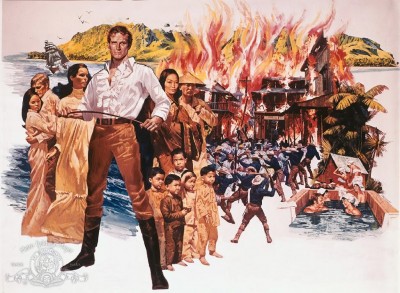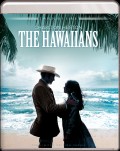| Reviews & Columns |
|
Reviews DVD TV on DVD Blu-ray 4K UHD International DVDs In Theaters Reviews by Studio Video Games Features Collector Series DVDs Easter Egg Database Interviews DVD Talk Radio Feature Articles Columns Anime Talk DVD Savant Horror DVDs The M.O.D. Squad Art House HD Talk Silent DVD
|
DVD Talk Forum |
|
|
| Resources |
|
DVD Price Search Customer Service #'s RCE Info Links |
|
Columns
|
|
|
Hawaiians, The
Each film adapted portions of James Michener's epic, 937-page novel Hawaii (1959). The first movie adapted only the third of six epic-length chapters, while The Hawaiians tackles the fourth and part of the fifth. Where the core of Hawaii's drama lies in an almost entirely internal, personal struggle of religious faith, The Hawaiians, while slightly more conventional, covers similar concerns about the colonization of the islands more grippingly. Oddly, where in Hawaii indigenous Hawaiians are largely tangential to the plot, The Hawaiians is even less about native Hawaiians, reduced to bit players here. Nevertheless, it's really an underrated work, and its relative obscurity compared to the first picture is puzzling.
Twilight Time's new Blu-ray may go some distance to change that. Unlike their Blu-ray of Hawaii, which utilized a perplexingly inferior high-def transfer of the general release version, The Hawaiians positively sparkles in high-def, an almost flawless transfer.
The Hawaiians begins 40 years after the events in Hawaii. Whipple "Whip" Hoxworth (Charlton Heston) is a sea captain shipping indentured Chinese laborers to Hawaii. He returns home to needy, psychologically-troubled wife Purity (Geraldine Chaplin) and learns that his grandfather (apparently Richard Harris's character in Hawaii, though the film only hints at this) has died. Hoxworth loved the old man, but is surprised to learn he's been aced out of his grandfather's will. (Meant as a compliment: the will states Hoxworth is the only family member self-reliant enough not to depend on such income.) Hoxworth had hoped to transform the family's shipping trade into a scheduled line but the sanctimonious, "respectable" family, led by cousin Micah Hale (Alec McCowen, playing the only character to appear in both films), wants no part of disreputable Hoxworth. (In condensing so much story into a 134-minute film, the family's distaste for Hoxworth, alluding to a hell-raiser past, is never adequately elucidated.)
Meanwhile, Chinese immigrants Mun Ki (Mako) and Nyuk Tsin (Tina Chen), the latter shipped to the islands to work in a brothel but instead taken in by the former, go to work at Hoxworth's modest ranch. He wants to earn enough money to return home to his wife a wealthy man, but she dreams of building a life on the island.
A prospector successfully drills fresh water on Hoxworth's land. This inspires Hoxworth to attempt to cultivate an exotic fruit, its seeds stolen from French Guinea: pineapple.
Purity, part-Hawaiian royal blood in her veins, gradually succumbs to a kind of madness, possibly the result of decades of inbreeding among the royal family. Meanwhile, Mun Ki develops leprosy and faces banishment to the Island of Molokai, where lepers live under almost prehistoric conditions. Should the devoted but ambitious Nyuk Tsin, herself healthy, accompany him, or stay to raise her five sons and pursue her dream of a Chinese-American empire?
Generally excellent, The Hawaiians covers much the same territory as Hawaii but the drama is more compelling. The first picture partly explored the exploitation of Hawaii and the native Hawaiians by Christian missionaries while, in The Hawaiians, it's the later exploitation of Chinese laborers. When the enterprising Chinese begin starting their own businesses and community, the wealthy whites import even cheaper labor from Japan, which they discover are culturally quite different from the Asians that preceded them.
Heston's Hoxworth is the film's hero, though with nearly half a century of hindsight his attitudes seem alternately racist, misogynistic, and occasionally quite pompous, though that may have been intentional. Later in the story, for instance, he takes a doting Japanese mistress who's like a western world fantasy of Asian women, in one scene virtually lighting his pipe and putting on his slippers when he returns home. (Amusingly, the Chinese and Japanese women occasionally seen topless all have uncharacteristically huge breasts. This must have been a labor of love for casting director Lynn Stalmaster.)
At the beginning of the picture Hoxworth is, essentially, a slave-trader who regards the Chinese as something less than human, certainly inferior to whites. This attitude changes through his interesting relationship with Nyuk Tsin, the only person on the island he can truly relate to. He admires her indefatigable ambition and determination, as well as dedication to her family's financial security, attitudes that he shares.
As with Hawaii, the acting is mostly excellent and, like that film, the performance by a racial minority and relative newcomer stands out. Tina Chen had only done one other movie before this, a supporting part in Alice's Restaurant (1969), but she's great in this, the 20-something actress believably aging several decades over the film's story and her scenes with Japanese actor Mako (again playing a memorably tragic character on the heels of The Sand Pebbles) are particularly good.
The only real failing of the film is with Geraldine Chaplin's character, whose madness and estrangement from Hoxworth is never adequately explained, nor her later obsession with Hawaiian culture. One suspects one or more scenes with her may have been shot but excised from the final cut. In the movie, her character disappears two-thirds of the way through, never to be heard from again.
Similarly, the picture seems to be sprinting toward the finish line with its abbreviated romance between Hoxworth's grown-up son, Noel (John Phillip Law), and Nyuk Tsin's daughter, Mei Li (the always delightful Virginia Ann Lee). It's a necessary subplot but feels crammed in and almost perfunctory, through Law is well-cast. Similarly, cut scenes might explain the appearance by prominent character actor James Gregory, a bigger name than many credited performers while he goes unbilled. (In Beneath the Planet of the Apes, also with Heston and released almost simultaneously, Gregory was billed seventh.)
The Hawaiians is handsomely produced all-around. Henry Mancini's score is far less famous than much of his other film work but it's lush and evocative. Tom Gries does a fine job as director, in what was the third of three strong collaborations with Heston, the other two being Will Penny (1968) and Number One (1969).
Video & Audio
Filmed in Panavision with original theatrical prints by DeLuxe, The Hawaiians looks fabulous, very bright and sharp with a pleasing, barely-perceptible level of film grain - day to Hawaii's night. Originally released mono, the DTS-HD Master Audio is likewise great for a regrettably monophonic release. English subtitles are included and the disc is region-free, albeit limited to 3,000 copies.
Extra Features
Supplements include an original trailer in HD; an isolated score track; and Julie Kirgo's usual liner notes.
Final Thoughts
For such a big-scale production, The Hawaiians is strangely forgotten, but Twilight Time's new Blu-ray really sparkles and interested parties should rush out and buy it. Highly Recommended.
Stuart Galbraith IV is the Kyoto-based film historian and publisher-editor of World Cinema Paradise. His new documentary and latest audio commentary, for the British Film Institute's Blu-ray of Rashomon, is now available.
|
| Popular Reviews |
| Sponsored Links |
|
|
| Sponsored Links |
|
|
| Release List | Reviews | Shop | Newsletter | Forum | DVD Giveaways | Blu-Ray | Advertise |
|
Copyright 2024 DVDTalk.com All Rights Reserved. Legal Info, Privacy Policy, Terms of Use,
Manage Preferences,
Your Privacy Choices | |||||||













